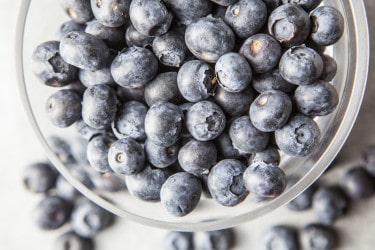nutrition
Are Blueberries Acidic? Here’s Everything You Need to Know
On This Page

Don’t let a little acidity keep you from enjoying blueberries. The tasty little treat packs quite a nutritional wallop that’ll leave you saying what acid.
It’s hard to believe that something as tasty as fresh blueberries can be one of the most acidic fruits in existence. But you don’t need to let that stop you from enjoying them.
Are blueberries acidic?
The short answer is yes, but no more than your average tomato. And the benefits of eating the delicious, nutritious, powerhouse likely outweigh the negatives of its acidity. Blueberries are so good and so good for you that you might want to get more information before you leave them in the produce aisle.
What is the pH level of blueberries?
If you look at the pH scale, you will see that it ranges from 0 to 14, where 0 is the maximum acidity a substance can have and 14 is the maximum alkaline level. Foods that come in at or around 7 are considered neutral. Blueberries have a pH of 3.1 - 3.3 which makes them much more acidic than most fruit, though certainly not lemons. Fortunately, the good significantly outweighs the bad when it comes to the pH of blueberries. Yes, they are acidic, but so rich in minerals and nutrients that they are actually one of the healthiest fruits of them all.
Are blueberries bad for indigestion?
Blueberries are high in fiber and overindulging can potentially result in digestive symptoms such as bloating and gas. They also contain a large amount of salicylates, so if you are sensitive or allergic, you, too, may experience some unpleasant symptoms. If you are enjoying your blueberries in moderation and still experience side effects, talk to your physician about possible food sensitivities.
What about blueberry jam and blueberry juice?
When it comes to blueberry jam and blueberry juice, the first thing you need to do is read the label. Both can contain high levels of sugar and neither have any dietary fiber. Cold pressed 100% blueberry juice may have more bioavailable antioxidants than other blueberry juices and you might find alternative options with healthier sweeteners or lower overall sugar content. According to this review, sugar-free jams retain higher levels of anthocyanins since refrigeration helps to maintain the antioxidants in both the sugar and non-sugar jams. In general, whole fruits are always more nutrient dense and beneficial than juices and jams, even if the juices and jams are made with fresh, delicious blueberries.
Can you reduce the acidity of blueberries?
The acidity of blueberries can easily be countered by a bit of menu planning on your part. You can blend them with high pH ingredients to neutralize the acidity. A small serving of blueberries is perfect with your oatmeal or in a smoothie each morning. You can also enjoy blueberries in salads or with Greek yogurt for a healthy meal or snack. The list of high alkaline foods you might combine with blueberries to offset the acidity includes almonds, walnuts, cashews, spinach, lettuce, avocado, bananas, coconut milk, and kale. With a little creativity, delicious combinations that include blueberries are plentiful.
Should you eat blueberries?
Yes, yes, a thousand times yes! There’s a reason so many people call the blueberry a superfood. The nutrient count alone is a great reason to eat blueberries. They are a rich source of antioxidants that can combat oxidative stress and free radicals. They contain phytochemicals that may also promote gut health, and also promote insulin sensitivity. Research has shown that a higher intake of flavonoids, especially from berries, appears to reduce the rate of cognitive decline in older adults. Higher anthocyanin intake (like you find in blueberries) promotes cardiovascular health and may, according to this research, reduce the risk for cardiovascular issues in predominantly young women.
When should you avoid blueberries?
Blueberries are on the dirty dozen list meaning that they are one of the most heavily sprayed produce items. If possible, you would be well served to choose organic or frozen organic in order to reduce exposure to pesticides. If organic is not an option, you can also consider washing your blueberries (and any other non-organic fresh produce) with produce cleanser.
Final takeaways
Blueberries are a nutritional powerhouse that many refer to as a superfood. They’re packed with nutrients and antioxidants, and support healthier aging, heart health, and cognitive improvements in older adults. They are more acidic than most fruits, but you can usually offset this acidity with complementary alkaline foods. In a nutshell, blueberries are delicious, make a great snack, and are a wonderful ingredient in many recipes. Add them to your oatmeal, put them in your smoothie, or just enjoy them on their own. They’re also pretty amazing in your pancakes, pies, muffins, and syrup, but the nutritional benefits, taste notwithstanding, will be hard to pinpoint.



